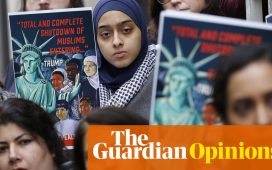At a gas station in Mesa, Arizona, more than 2,300 miles from where the twin towers fell on 9/11, stands a permanent reminder of long reaching trauma.
A memorial constructed with speckled white marble and black tile marks the spot where Balbir Singh Sodhi was shot and killed, becoming the first American victim of a fatal hate crime in the aftermath of 9/11.

It was 15 September, almost 20 years ago, that Sodhi, a Sikh immigrant from the Indian Punjab, was fatally shot in an act of racist hate as he planted flowers around the parking lot of his new business to commemorate the victims of the terror attacks in New York.
The gas station has remained largely as it was then. It is still owned by the Sodhi family and Balbir’s son, Sukhwinder Singh Sodhi, now 48, is here every day managing the staff, handling the checkout, balancing the books and working 60 hours a week. He tries to keep his eyes away from the memorial.

“The pain is still there,” said Sukhwinder. “I miss him every day.”
On Wednesday, as has happened for the past 19 years, members of the Sodhi family, other organizers in the Sikh and Muslim communities, interfaith groups and others will gather to remember the man who was shot and killed here.
Even after two decades the memories are still raw. Not only is the Sodhi family’s journey a story of grief, trauma, struggle and forgiveness, it is also one achingly resonant with many immigrant families in post 9/11 America.
Balbir Singh Sodhi moved to the United States in the late 1980s with a number of his brothers, who left the Punjab after a series of anti-Sikh pogroms following the assassination of Indira Gandhi. They had all believed in the basic premise of the American dream: with hard work and dedication they could find stability and economic prosperity.
The gas station, opened only a year before his death, became a symbol of the family’s toil. Balbir built the business himself with money he had saved since arriving in the US. In the year he operated it, he became known for his generosity, handing out free candy to children who came in and spoiling his own kids and many nieces and nephews.

It was a senseless act of violence that took Balbir.
A white gunman named Frank Roque, 42 at the time, began his rampage in the early afternoon. First he shot Balbir dead, mistaking his turban for an indication of Muslim faith. Then, 20 minutes later, he shot at another gas station, aiming for a Lebanese-American clerk. He missed. The final stop was to the place he used to live, then the home of an Afghan-American family. He missed again.
Shortly after, he was arrested and reportedly shouted: ‘‘I stand for America all the way,’’ as he was placed in handcuffs. Former colleagues testified at trial that Roque had long made racist remarks in public and, on the day of 9/11, had told a co-worker using racist slurs that he planned so-called reprisal attacks.
“We should round them all up and kill them. We should kill their children, too, because they’ll grow up to be like their parents,” Roque said.
Rana Sodhi, Balbir’s younger brother, has always remained steadfast that his brother’s death should unify the community against hatred. He continues to speak in schools, colleges and other venues around the country, discussing the peaceful tenets of Sikhism and telling the story of his brother’s life and death.
“Even after 20 years, it seems like yesterday,” he said, sitting at his home in Mesa, next to a mantle that is decorated with drawings of his brother and photographs of his many public appearances – including with former president Barack Obama – made in the aftermath. “I know it is still sad for us. We lost our brother. But his death brought a lot of positivity, to bring the community closer to each other. Bringing people closer together.”

But just as the 9/11 attacks became a turning point in the scope and scale of international terror, the murder of Balbir Sodhi Singh marked the beginning of a pronounced wave of anti-Islamic and anti-immigrant hate in America.
US government data on hate crimes is notably spotty, but in the year after 9/11, targeted crimes against Muslims increased by 1,700 percent nationally, according to the FBI. So too did hateful acts against Sikh Americans, with advocacy groups reporting 300 incidents against the religious minority in the month after September 11.
Sodhi’s killing shocked minority communities throughout Arizona.
Azza Abuseif, the executive director of Arizona’s chapter of the Council on American Islamic Relations [Cair] recalled hearing of the murder for the first time as a young, recently arrived immigrant.
“It set off a lot of fears,” she said, pointing out that Sodhi was targeted because of his clothing. “Muslim men don’t usually dress in traditional clothing in the workplace but a lot of women have lived in fear since 9/11.”
Abuseif started her job as executive director just a few months ago. Cair’s offices are unmarked and she sits in a room with the blinds closed. On her first day in the new office she recalled scanning the room for escape routes in case of an active shooter.

“I don’t want to say I live in fear,” she said. “But I worry for my family because of my line of work.”
She will attend the memorial service for Balbir Singh Sodhi on Wednesday, a marker of collective interfaith mourning.
Arizona has long been a hotbed of post 9/11 Islamophobia and anti-immigrant hatred that only intensified over the four years of the Trump presidency. Armed protest outside the city’s main mosque in the suburb of Tempe became a regular fixture. In 2018 two women were charged with breaking into the Islamic Community Center of Tempe, where they recorded themselves stealing a Quran and making Islamophobic slurs.
The state’s gun laws, which permit open carry without a license, are viewed as causes for increased concern among minority communities here.
During a recent Friday prayer at the mosque attended by the Guardian, armed guards provided security as worshippers entered to pray. They have been present at every Friday prayer since 9/11, Islamic Center officials said.

On the same afternoon, Sukhwinder took time to reflect on the past four years as he sat in the gas station’s stockroom, filled with pallets of soft drinks and snacks. Trump won Arizona with a slim three-point margin in 2016. The former president campaigned on a platform of naked Islamophobia and anti-immigrant sentiment, and after entering office, he immediately implemented a travel ban targeted at Muslim-majority countries and imposed a harsh crackdown at the border.
The state was taken by the Democrats in a narrow victory in 2020, with Maricopa county, where Mesa is situated, also swinging. But the margins are thin and Sodhi is well aware that many of his customers are certain to have voted for Trump both times.
“It worries me sometimes because hate has grown so much. But people here have known me and my family for 20 years. They don’t bother us,” he said. “I still have very strong faith in this country even during the Donald Trump era.”
And yet for all his resolve, Sukhwinder is frank when discussing the everyday racism he faces, a story familiar to many minority small business owners around the country. The day before we met, he confronted a shoplifter in the store who shouted “Go back to your own country” when confronted over the stolen goods.
“I always tell them: ‘this is my country, where do you want me to go? You are stealing from my gas station.’”

For many years the family heard nothing from Frank Roque.
In 2003 he was found guilty of murder, despite pleading not guilty due to insanity. His death sentence was commuted to life in prison by the Arizona supreme court a few years later. The Sodhi family did not object.
“As long as he is away from society and our family, it’s fine,” Rana told local press at the time.
But in 2016, through a family friend, Rana spoke to Frank Roque from prison. The entire conversation was uploaded to YouTube and makes for startling viewing. As Roque stumbles for words and attempts to apologise he also does not accept responsibility for his actions and continues to balance his acts of violence against the deaths on 9/11.
“The only thing I can say is that I’m sorry for what happened to his brother. As I am for what happened to the 5,000 other innocent people that died on 9/11,” he says. “We all have to be sorry for that also.”
Holding back tears, Rana says: “We already forgave you.”
It would be another four years before the Sodhi family heard from Roque again, this time by letter. In 2020 the convicted murderer asked the family to back his petition for early release.
“I am filing a court petition and the statement from you and your family will help me very much. Thank you and your family for the forgiveness,” the letter says.
Rana was taken aback and his good nature inclined him to support the petition. But other members of the family felt uneasy, almost insulted.
“I cannot forget,” said Sukhwinder. “He took my father away. I have nothing against him. No hate. But forgive is a big word.”
After the family met they decided they would not support the petition, concluding they could not support early release in case Roque committed future crimes. They have not heard from him since and Roque remains incarcerated.
Sukhwinder’s mind drifted away from his father as he price tagged the canned foods on the aisles inside the gas station. Despite all the trauma that happened here 20 years ago, it is still the place he loves more than anywhere else.
The gas station itself closed for only one day after Balbir was killed. It has never closed since.
“I love this place. I feel safe here,” he said, a framed photograph of his father above a nearby drinks refrigerator. “I know the people here. It’s my community.”
His mind pivoted back to Balbir. “I’m just so proud of what he did and what he accomplished. Because this was his dream. And I’m proud of what I have done to continue it.”







